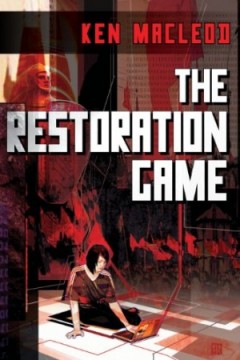
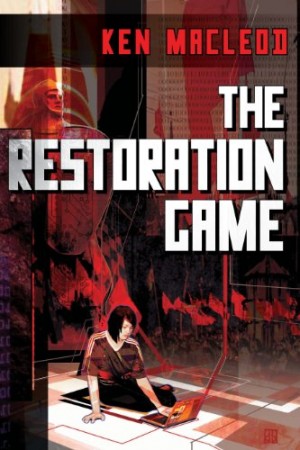
Having never read a Ken MacLeod novel before, I found my introduction to him to be a bit rocky. The opening chapters of The Restoration Game were replete with irritants. After that it settled down and started to tell an interesting story, but never quite managed to completely convince. It had the right ingredients for a better tale, but it could not get the doses right and wound up feeling, for all its positive points, out of balance.
The story’s protagonist, Lucy Stone, spent most of her childhood in the fictional Soviet Republic of Krassnia, but now works for a computer game company in Edinburgh. Her company is hired to make a Krassnian version of a popular medieval computer game, and her heritage and lingual abilities, rare to be found in the West, are the reason her company was chosen. There is more to this request for a Krassnian video game than is initially apparent, however. Lucy’s mother is a former CIA operative, and another man who might be her father is mired in the same kind of political intrigue. Through them Lucy gets entangled in an international plot the details of which are murky but the danger in which becomes increasingly apparent. Finally, she finds herself on a mission with consequences so far reaching that “epic” does not seem to do them justice.
[continue reading…]
Help Promote Prometheus Unbound by Sharing this Post
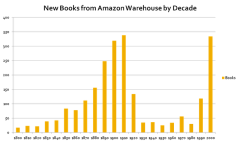
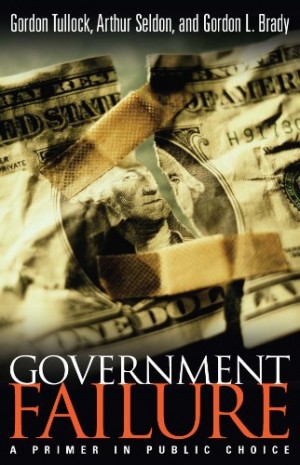
How gigantically humongous and intrusive is the federal government? A traditional measure is to look at the pages of regulations in the Federal Register, which is, by now, probably the world’s largest book collection. The problem with this approach is that it takes no account of how a single bad regulation can have monstrously deleterious effects.
Copyright regulation is a good example of this. There was no universal enforcement until the very late part of the 19th century, and terms were mostly short in the early days of this regulation. In the course of the 20th century, regulations became ever more tight and the copyright terms ever longer, so much so that today, the words you sign away to a conventional publisher are theirs to keep for your lifetime plus 70 years!
One standard argument for doing this is that noncopyrighted works will not be efficiently exploited. You have to assign ownership or else the resource will vanish into the ether. No one will care about it, and civilization will lose extremely valuable literary works. Our market for ideas will be impoverished.
Now, to me, this argument seems obviously false, but that’s probably because of my own experience in publishing. I’ve seen it happen — so many times that it is predictable — that once a work has fallen out of print but is still under some kind of protection, it is mostly neglected by the heirs. No one who “owns” the work has the incentive to bring it to light, while those who care about it fear the law or don’t want to pay some arbitrary price set by the owners.
Meanwhile, when a work is public domain, there are dozens of people bidding to get it into print. This was true all throughout history, actually. The reason American school kids in the 19th century read British literature is that it was not regulated in the United States, and therefore, it could be sold very cheaply and distributed very widely. It is true today: Whether music or books, the material in the commons is far more in demand than that which is regulated. And the demand leads to the supply.
In other words, the opposite of the conventional exploitation theory is correct. The copyrighted works drop from memory, while the public domain works last and last. But of course, this observation draws from my deep involvement in the industry, and we can’t expect academic scribblers to understand anything about how the world actually works in real life.
[continue reading…]
Help Promote Prometheus Unbound by Sharing this Post


Nominations are now closed for our June read. It’s time to vote on the book we’re going to read next month.
Here are the candidates:
Shadow and Claw is comprised of the first two books of Gene Wolfe’s four-volume The Book of the New Sun (1980–83), which is a critically acclaimed work of far-future science fantasy in the Dying Earth tradition of Jack Vance. The Shadow of the Torturer is the tale of young Severian, an apprentice in the Guild of Torturers on the world called Urth, exiled for committing the ultimate sin of his profession — showing mercy toward his victim. The Claw of the Conciliator continues the saga of Severian, banished from his home, as he undertakes a mythic quest to discover the awesome power of an ancient relic, and learn the truth about his hidden destiny.
Farnham’s Freehold by Robert Heinlein — It’s a cross-time fight for freedom as a family retreats to a bomb shelter during a nuclear attack — only to emerge hundreds of years in the future, thrown forward in time by the blasts. There lifeboat ethics rule as they struggle to survive … until they’re discovered by up-time humans, the survivors of the apocalypse. These survivors are of African descent. Down-time humans — in fact, all of the European-descended — are held guilty for the state into which the world has fallen and designated as automatic slaves. The only escape is to find a way back down-time, to change events sufficiently to make absolute certain this nightmare future never get a chance to happen in the first place!
The Freedom Maze — Delia Sherman’s young-adult fantasy novel focuses on an adolescent girl of 1960 who is magically sent back in time to 1860 when her family owned slaves on a Louisiana plantation. With her summer tan, she’s mistaken for a slave herself, and she learns the hard way what life was like. In the process, she comes to appreciate the values of honor, respect, courage, and personal responsibility.
Ready Player One — Ernest Cline’s genre-busting blend of science fiction, romance, suspense, and adventure describes a virtual world that has managed to evolve an order without a state and where entrepreneurial gamers must solve virtual puzzles and battle real-life enemies to save their virtual world from domination and corruption. The novel also stresses the importance of allowing open access to the Internet for everyone.
Snuff — A Discworld novel by Terry Pratchett (winner of a Prometheus Award for Night Watch, also set in Discworld), Snuff blends comedy, drama, satire, suspense and mystery as a police chief investigates the murder of a goblin and finds himself battling discrimination. The mystery broadens into a powerful drama to extend the world’s recognition of rights to include these long-oppressed and disdained people with a sophisticated culture of their own.
[continue reading…]
Help Promote Prometheus Unbound by Sharing this Post
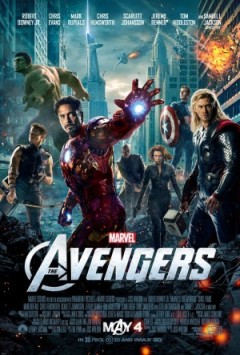
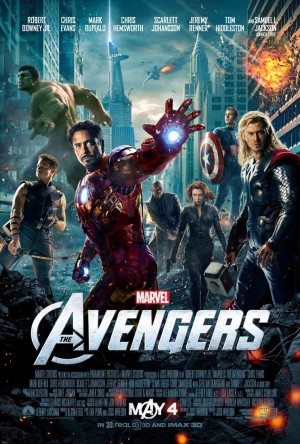
After a series of movies about individual superheroes, movies that gave us their origin stories, we have finally been treated to the culmination of the last few years and so many millions of man-hours: The Avengers. The films leading up to it were generally fair to middling, I thought, with the first Iron Man rising maybe half a skosh above that level. The latest comes heralded by uniformly positive reviews. It is, we are told, much better than one would expect. According to most reviews, there is a greater focus on character than one usually gets in an action movie, but there is no skimping on set pieces. The reality, for me, was more of the same: half a skosh above decent.
Loki, Thor’s brother and fellow god, wants to rule the Earth. He makes a deal with some aliens who agree to conquer the Earth for him in exchange for the Tessaract, an artifact of immense power, which will also play a role in transporting the invading army to New York to begin the takeover. Loki steals the Tessaract from Nick Fury, who then assembles the Avengers to find him, find it, find out what the plan is, and do anything else that needs a little superpower elbow grease. A lot of bickering between incompatible personalities and a whole lot of violence and destruction ensue.
The plot is unremarkable but perfectly adequate, and that is a good description for the movie as a whole. There are no scenes whose impact lingers in your memory after the credits have rolled, no wonderful development of character, no stunning visuals, no lines of great insight, no “aha!” moments. What it does have, to go with its serviceable story, is competent direction, a few genuinely amusing visual jokes, a bevy of one-liners that play well to an opening-weekend audience, and the action set pieces that many movie goers — mostly male — crave sometimes to the exclusion of all else.
[continue reading…]
Help Promote Prometheus Unbound by Sharing this Post
















